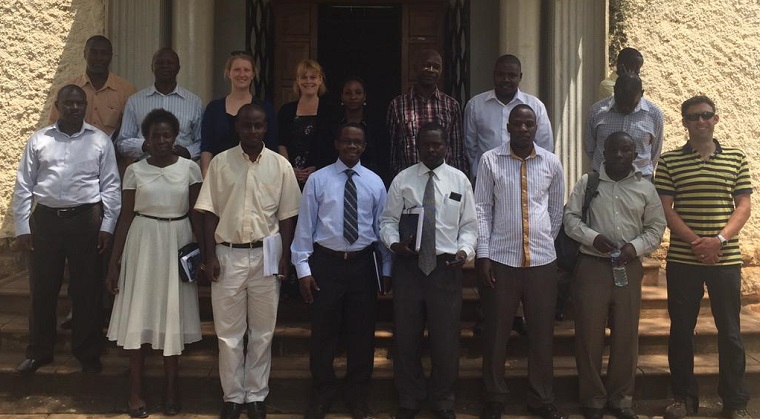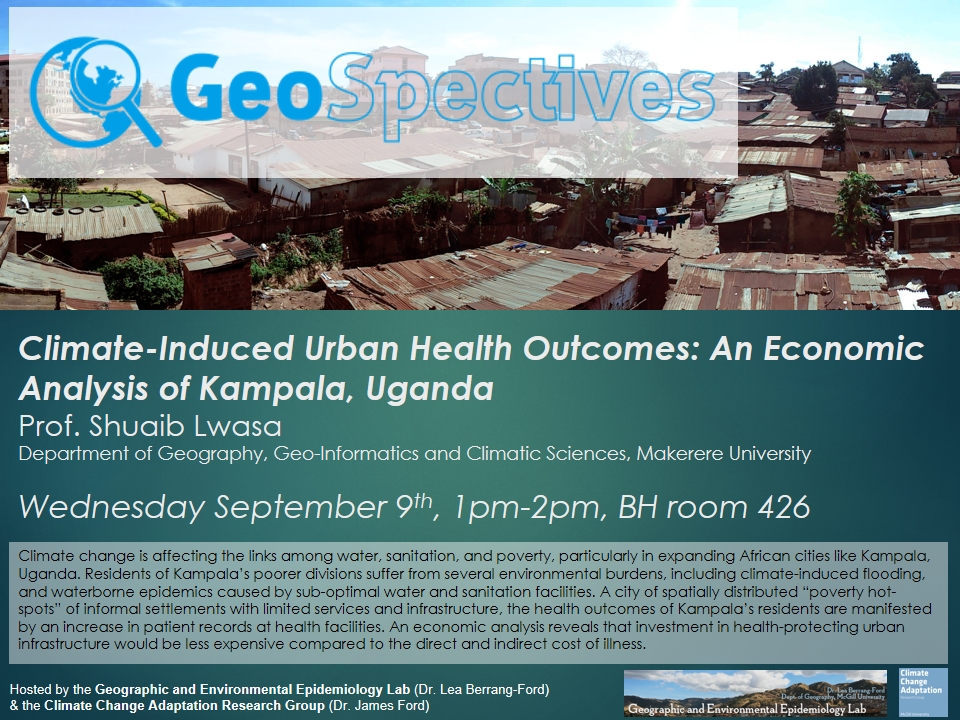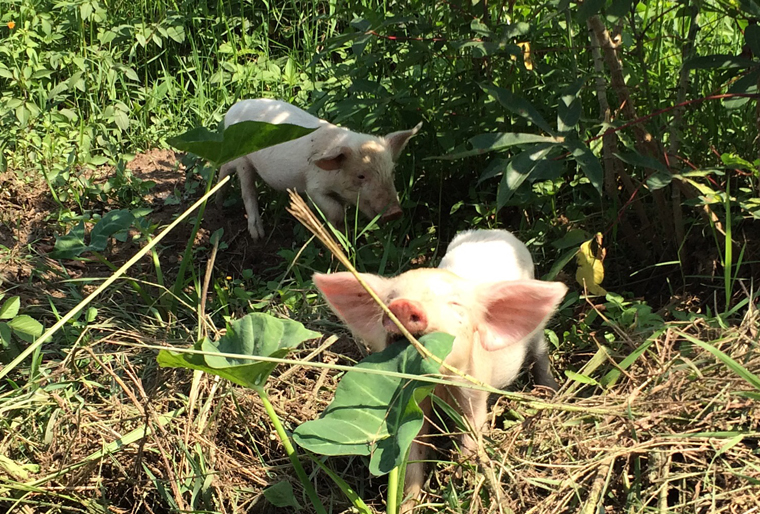Notes from the field: Sarah and Vivienne’s final days in Buhoma
Sarah MacVicar, an M.Sc. student from McGill University was in Uganda this summer conducting her thesis research with Vivienne Steele, a Research Assistant from the University of Guelph. Here is their last update from the field. Text and photos by Vivienne Steele and Sarah MacVicar.
We have wrapped up our seven weeks in the field and are now settling back into life in Canada. The final weeks were a flurry of data entry and sharing results with local partners but we managed to finish everything we needed to do.
Our biggest challenge was completing the data entry from the maternity records, but with some help from the wonderful records department staff, we were able to finish entering the complete set of records. The hospital IT staff were pleased with this contribution and we hope it will be helpful to a number of hospital staff in their research. One evening as we were working late entering records, we got the call we had been awaiting—there was a birth happening on the ward and we were invited to come and assist with the procedure! Cradling this brand new creature moments after it entered the world and tying off the umbilical cord put into perspective everything we have been working on. The experience made it starkly apparent why facility-based deliveries can be so important-- the mother bled profusely and the nurse was concerned about postpartum hemorrhaging. Fortunately the sutures held and the mother was able to sit up and meet her baby girl. As the nurse entered the birth information in the record, she asked for our names—we are now listed as having assisted during the birth on the very records we have spent weeks entering.
In our second last week in Buhoma our friend Levi from BDP guided us on the Batwa Experience tour. We headed up a steep mountain path and were welcomed by a traditional dance by several Batwa men and women, who then demonstrated honey-harvesting, hunting practices, and medicinal plant identification. Learning about the traditional way of life for the Batwa in the forest contrasted greatly with what we saw on our community visits to their new settlements. The preservation of traditional knowledge through the Batwa Experience is an important initiative, but it also reminded us how many traditional food sources were lost when the Batwa were evicted from the forest.
Another big highlight of our last two weeks in Buhoma was the chance to see some mountain gorillas! We got to watch a family of gorillas who were taking a break for a lunch snack on their way back into the park.
On our final day, we held a preliminary results sharing meeting at the hospital, where 40 BCH staff were in attendance. It was a great chance for us to give a summary of IHACC, our projects, the work we had been able to accomplish while at BCH, as well as next steps. We also gave an overview of the health records evaluation draft. Our presentation was well received, and the staff were eager to review the soft copies of the evaluation that we distributed. Many people offered some great feedback and questions about the direction of our research.
We will miss BCH, Bwindi and the many connections and friends we have made in Uganda. However, we are looking forward to continued collaboration with our Ugandan partners as we develop our projects over the coming months. We are very grateful to all who have helped us and feel fortunate to have had this experience. This time has reminded us both of the value of fieldwork; it has grounded our research in real-life experience and motivated us to make our research useful and relevant for BCH and the communities we have been working with.
New IHACC paper looking at food insecurity in Iqaluit, Nunavut published in International Journal of Circumpolar Health
Guo, Y., Berrang-Ford, L., Ford, J., Lardeau, MP., Edge, V., Patterson K., the IHACC Research Team, and Harper, S. (2015). Seasonal prevalence and determinants of food insecurity in Iqaluit, Nunavut. International Journal of Circumpolar Health. Abstract
Background. Food insecurity is an ongoing problem in the Canadian Arctic. Although most studies have focused on smaller communities, little is known about food insecurity in larger centres.
Objectives. This study aimed to estimate the prevalence of food insecurity during 2 different seasons in Iqaluit, the territorial capital of Nunavut, as well as identify associated risk factors.
Design. A modified United States Department of Agriculture Food Security Survey was applied to 532 randomly selected households in September 2012 and 523 in May 2013. Chi-square tests and multivariable logistic regression were used to examine potential associations between food security and 9 risk factors identified in the literature.
Results. In September 2012, 28.7% of surveyed households in Iqaluit were food insecure, a rate 3 times higher than the national average, but lower than smaller Inuit communities in Nunavut. Prevalence of food insecurity in September 2012 was not significantly different in May 2013 (27.2%). When aggregating results from Inuit households from both seasons (May and September), food insecurity was associated with poor quality housing and reliance on income support (p<0.01). Unemployment and younger age of the person in charge of food preparation were also significantly associated with food insecurity. In contrast to previous research among Arctic communities, gender and consumption of country food were not positively associated with food security. These results are consistent with research describing high food insecurity across the Canadian Arctic.
Conclusion. The factors associated with food insecurity in Iqaluit differed from those identified in smaller communities, suggesting that experiences with, and processes of, food insecurity may differ between small communities and larger commercial centres. These results suggest that country food consumption, traditional knowledge and sharing networks may play a less important role in larger Inuit communities.
IHACC-Peru PhD student Paola Torres-Slimming awarded UNESCO/Keizo Obuchi Research Fellowship
The IHACC team would like to congratulate Ms. Paola Alejandra Torres Slimming for being awarded a UNESCO/Keizo Obuchi Research Fellowship (also known as the UNESCO/Japan Young Researchers' fellowship).
The funds will enable Paola to undertake research on Adaptation to climate change: Water security in vulnerable populations for seven months at the University of Guelph in Canada with Dr. Sherilee Harper and the IHACC team, and the Instituto Nacional de Salud de Cuernavaca in Mexico with collaborators there.
From the entire IHACC team, congratulations Paola!
IHACC project leads in Bwindi and Kampala to discuss next steps for IHACC in Uganda

 IHACC project leads Dr. James Ford, Dr. Lea Berrang-Ford, and Dr. Sherilee Harper were in Uganda this week with Dr. Shuaib Lwasa and Didacus Namanya for a series of project meetings in Buhoma and Kampala, and partner community visits in and around Bwindi.
The team first met with partners and collaborators in Buhoma last week to discuss and plan for future IHACC project work in Uganda. After successful and productive meetings there and visits to partnering Batwa communities and Bwindi Community Hospital (BCH), the team returned to Kampala for additional meetings before they head back to Canada.
In Kampala, the team was invited to speak on it experience with team building and mentorship through the IHACC project at the departmental meeting of Makerere University's Department of Geography. This was a great opportunity for the team to share experiences from the last 4 years of the project, and create new relationships for future research and collaboration.
IHACC project leads Dr. James Ford, Dr. Lea Berrang-Ford, and Dr. Sherilee Harper were in Uganda this week with Dr. Shuaib Lwasa and Didacus Namanya for a series of project meetings in Buhoma and Kampala, and partner community visits in and around Bwindi.
The team first met with partners and collaborators in Buhoma last week to discuss and plan for future IHACC project work in Uganda. After successful and productive meetings there and visits to partnering Batwa communities and Bwindi Community Hospital (BCH), the team returned to Kampala for additional meetings before they head back to Canada.
In Kampala, the team was invited to speak on it experience with team building and mentorship through the IHACC project at the departmental meeting of Makerere University's Department of Geography. This was a great opportunity for the team to share experiences from the last 4 years of the project, and create new relationships for future research and collaboration.
A noteworthy output of these meetings is an invitation for Dr. Lwasa to come to Montreal for additional collaborative work at McGill University in the Fall with the Canadian IHACC team from Dr. Ford.
More to come from IHACC-Uganda as the project enters its final year!











